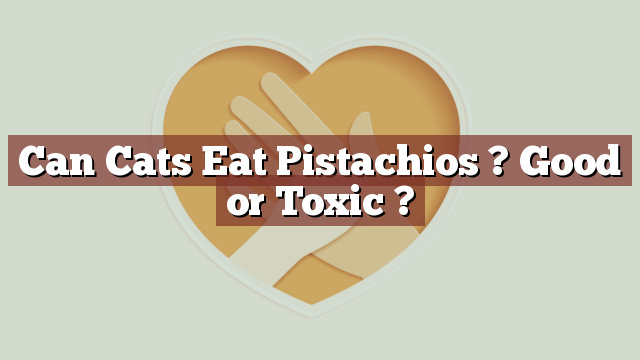Can Cats Eat Pistachios? Good or Toxic?
One important aspect of being a responsible pet owner is knowing which foods are safe for your furry friend to consume. Cats have unique dietary needs, and it is crucial to be aware of what they can and cannot eat to ensure their health and well-being.
Nutritional Value of Pistachios: What Do They Contain?
Pistachios are a popular snack enjoyed by humans, known for their rich taste and high nutritional value. These small green nuts are packed with essential nutrients such as protein, fiber, healthy fats, and various vitamins and minerals. They are a good source of antioxidants, which can help protect against oxidative stress and inflammation in the body.
However, when it comes to cats, their nutritional requirements are quite different from ours. While some human foods can be safely shared with our feline companions, others can be harmful or even toxic to them. Therefore, it’s essential to examine the safety of pistachios for cats.
Can Cats Eat Pistachios? Find Out If They Are Safe or Toxic.
No, cats should not eat pistachios. Although pistachios may seem harmless, they are not suitable for feline consumption. Cats have specific dietary needs, and their digestive systems are not designed to process certain foods that humans can tolerate.
One of the main concerns with pistachios is their high-fat content. Cats are obligate carnivores, which means their bodies are adapted to thrive on a diet primarily consisting of animal protein. Consuming foods high in fat can lead to gastrointestinal upset, pancreatitis, and even obesity in cats.
Furthermore, the shells of pistachios pose an additional risk. The shells can be a choking hazard and potentially cause digestive blockages if ingested. These blockages can be life-threatening and may require immediate veterinary intervention.
Potential Risks or Benefits of Cats Consuming Pistachios.
While pistachios may offer some nutritional benefits for humans, cats do not experience the same advantages. Cats require a diet that is low in carbohydrates and high in animal protein. Introducing foods like pistachios can disrupt the balance of their nutritional intake.
The high-fat content in pistachios can lead to weight gain and obesity in cats. Obesity is associated with various health issues in felines, including diabetes, arthritis, and heart problems. Additionally, the potential risks of choking or digestive blockages from the shells far outweigh any potential benefits.
What to Do If Your Cat Eats Pistachios: Steps to Take.
If you suspect that your cat has consumed pistachios, it is crucial to take immediate action. If your cat only ingested a small amount of pistachios without the shells, monitor them closely for any signs of discomfort or digestive issues. However, if your cat has eaten a significant quantity or ingested the shells, it is recommended to contact your veterinarian or an animal poison control hotline for guidance.
Your veterinarian may advise you to observe your cat for any signs of distress, such as vomiting, diarrhea, or difficulty breathing. In severe cases, they may recommend bringing your cat in for an examination or treatment to prevent complications.
Conclusion: Cats and Pistachios – Considerations and Recommendations.
In conclusion, it is best to keep pistachios away from your feline friends. Cats should not eat pistachios, as they can be harmful to their health. The high-fat content and the potential risks associated with the shells make them an unsuitable snack for cats.
To ensure the well-being of your cat, it is recommended to provide them with a balanced and species-appropriate diet specifically formulated for cats. If you have any concerns or questions about your cat’s diet or if they have consumed pistachios, consult your veterinarian for professional advice. By being mindful of what your cat eats, you can help keep them safe, healthy, and happy.
Thank you for investing your time in exploring [page_title] on Can-Eat.org. Our goal is to provide readers like you with thorough and reliable information about various dietary topics. Each article, including [page_title], stems from diligent research and a passion for understanding the nuances of our food choices. We believe that knowledge is a vital step towards making informed and healthy decisions. However, while "[page_title]" sheds light on its specific topic, it's crucial to remember that everyone's body reacts differently to foods and dietary changes. What might be beneficial for one person could have different effects on another. Before you consider integrating suggestions or insights from "[page_title]" into your diet, it's always wise to consult with a nutritionist or healthcare professional. Their specialized knowledge ensures that you're making choices best suited to your individual health needs. As you navigate [page_title], be mindful of potential allergies, intolerances, or unique dietary requirements you may have. No singular article can capture the vast diversity of human health, and individualized guidance is invaluable. The content provided in [page_title] serves as a general guide. It is not, by any means, a substitute for personalized medical or nutritional advice. Your health should always be the top priority, and professional guidance is the best path forward. In your journey towards a balanced and nutritious lifestyle, we hope that [page_title] serves as a helpful stepping stone. Remember, informed decisions lead to healthier outcomes. Thank you for trusting Can-Eat.org. Continue exploring, learning, and prioritizing your health. Cheers to a well-informed and healthier future!

